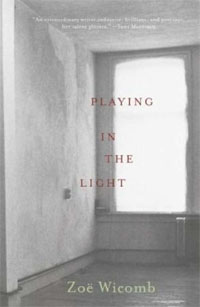|
Intermix.org.uk is a website for the benefit
of mixed-race families, individuals and anyone who feels they have a multiracial
identity and want to join us. Our mission is to offer a view of the mixed-race experience, highlighting icons, film, books, poetry, parenting techniques, celebrities, real lives and much more. Our online forums are a great place to meet others, ask questions, voice your opinions and keep in touch. Sign up for our monthly newsletter and delve into our pages. Want to join in? Become an Intermix member to take part: |
Playing In the Light
Zoe Wicomb
 Published
by The New Press
Published
by The New Press
Price: UK £14.99
Playing in the Light opens with a successful white Cape Town
businesswoman visiting her father, a retired traffic policeman. Apartheid
has ended, the rainbow nation has been born, and at the travel agency
she runs, Marion Campbell is slowly making adjustments, like appointing
its first black assistant. Her father John, an unreconstructed Afrikaner,
is depressed at the metamorphosis that has left the country he once served
proudly as a reservist going to the dogs, blarry kaffirs dragging it
further into anarchy, further from the idyllic past when they knew their
place.
At first, you might think that's all the story is going to be, and so
accurately are the characters portrayed that it would be enough. It would
be a story of quiet accommodations, of the slow tensions of change: Marion
relaxing in her luxurious apartment overlooking the beach she has long
since learnt not to walk on at night; Brenda Mackay, the new girl at
the travel agency, calmly challenging old assumptions; John drinking
whisky, dreaming of golden childhood summers on the veldt. The Truth
and Reconciliation Committee hearings might be on the TV and in the newspapers
daily, yet lives like these are where those abstract nouns are made flesh.
But Wicomb, subtly seeding her story with symbols,
allusions and half-buried memories, goes deeper still. As she gets under
the skin of her two main characters, she uncovers something else altogether.
Another skin, and a skin of a different colour too.
THEY CALLED THEM "PLAY-WHITES", PEOPLE like John Campbell and
his wife Helen. If apartheid had been absolutely impermeable, if officialdom
implacably unable to be bribed with money or sex, if rules were irredeemably
incapable of being bent, they would have been categorised as "coloured" from
birth through every single year of their lives.
But in South Africa, being white meant opportunity, whether getting on
or getting out. So among some families classed as coloured but who could
pass for white, sacrifices were made.
And what sacrifices! For John Campbell, for his dead wife Helen, it meant
turning their lives inside out. They couldn't be seen with their darker-skinned
families, so that meant a whole string of absences, from empty pews at
weddings to missing mourners at funerals. The family home had to be abandoned,
sisters and brothers had to be effectively renounced; grandparents who
could only come and visit if they pretended to be, and dressed as, servants.
Surnames had to be changed; ancestors' photographs painted over, lips
and noses thinned; thick-soled feet scraped tender. All the time a fear
of exposure, of what a casual incriminating word, an unnerving remembrance
of love, a racially inappropriate memory, could lead to. Constantly,
consistency: and no room for trekking off into dreams (or not real ones,
anyway); constantly, fending off inquisitiveness, the answers readily
prepared, aliases and alibis already present and correct; constantly,
constantly, fear.
Would a second child come out white, like Marion had? Perhaps not, so
no second child. No second child, and another absence for tension to
fill, like air rushing into a vacuum. Another absence like the empty
chairs round the Christmas dinner table and all the myriad other ways
in which appearances have to be kept up, and meanwhile, all the time,
the tension growing and growing "as if the very plaster was giving
its all to prevent the house from exploding".
So Wicomb pulls Marion from that sterile luxury flat, where her (unnamed,
naturally) "girl" will tidy up unpleasantnesses, on through
a journey through thickets of lacerating lies back into her family's
past. At the same time, this is a voyage into the new South Africa, where
the old divisions have been constitutionally shrunk away, but where they
still remain, like hidden cancers.
Source:living.scotsman.com
Check out our archives for more adult
books:
Back to adult books:
